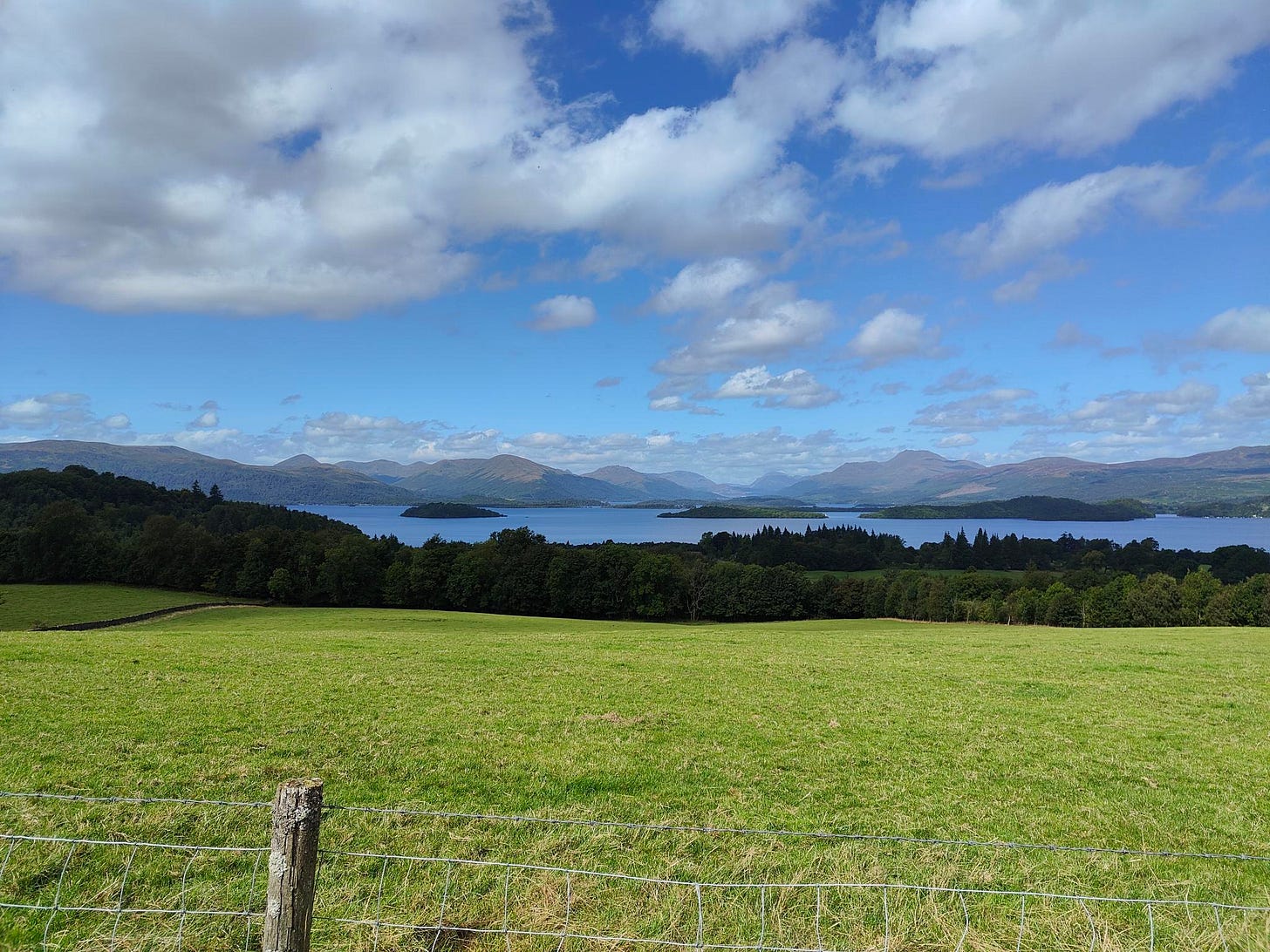Zahabi's Newsletter - August 24
Trains, lochs, utopias, and gender in Nicola Griffith, Ann Leckie & Ursula K. Le Guin
Dear reader,
Let’s debrief from Worldcon, then discuss how to subvert gender expectations in SFF, comparing three fascinating books in conversation through time. Contains trains, lochs, utopias and more!
What’s happening with the book – Worldcon & Worlds of Possibility
At Worldcon, I was lucky enough to be on a panel with guests of honours Jo Walton and Ken MacLeod, and accomplished writers Carrie Vaughan and Charlie Jane Anders, to discuss The Dispossessed by Ursula Le Guin. It was a very intimidating panel with people whom I felt had been writing and reading and thinking about both of those for a lot longer than me. But I relaxed as we got into the meat of the subject, and it was clear we all loved the book and wanted to dissect it together. As we discussed The Dispossessed, I discovered that Samuel Delaney had written an answer to Le Guin, Trouble on Triton: An Ambiguous Heterotopia. This is of course next on my reading list! If you weren’t at Worldcon and cannot catch up on the panel online, Charlie Jane Anders has an interesting TED Talk on utopias as a way to further the conversation.
Another highlight of Worldcon was the chance to meet up with my MA tutor Geoff Ryman, and to hear him discuss his latest novel, a wildly creative reimagining of Jesus’s life as a trans man: Him. A few panels also stood out, notably the one on “African Cultural Influences in Fantasy”, or the one on “Playing with gender expectations in SFF” – the latter which raised some of the points I’m going to explore below.
Before I do, however, I’ve got another short story published this month! It’s been a good year for short fiction, as stories that have languished on my computer are finally getting to go out and meet their readers. “Shooting Stars” is being published in the August 24 issue of Worlds of Possibility edited by Julia Rios. The collection is focused on feel-good fiction.
I wrote “Shooting Stars” back in Manchester, before I’d published anything of mine, as I’d just transitioned to writing in English. I’d moved from France to Manchester for my MA because I felt stuck with my writing, because I never seemed to succeed at getting it out there – changing languages seemed like a radical, but not irrational, decision. I remember sitting in a writers’ circle, probably only early evening but with night already set, rain lashing at the windows, and reading it in a quavering voice to a group of aspiring writers. It’s very much a story about yearning – about looking upwards.
What’s happening on the page – Subverting Gender in SFF
I recently finished reading Ammonite by Nicola Griffith and Ancillary Justice by Ann Leckie. Reading these two close together was an interesting experience, because I think both books attempt something similar, or at least inhabit the same space. They’re both, for want of a better description, worlds inhabited mostly by women – female-driven stories. But they both use women-only casts (or pronouns, we’ll get back to this) as a way to be genderless.
Ammonite is set in a world where only women have survived – a virus has killed all men on the planet. But Nicola Griffith doesn’t use this as way to make a statement about a male-less world, about what men represent or what it’s like to be without them. For her, it’s more a way to eschew gender altogether. It’s as if she, as a writer, tells us “They’re all women, there’s no gender dynamics. Can we move on to the interesting part?”
She can discuss power, relationships, trade, worldbuilding other cultures, love, trust – without bothering with the gender power dynamics or gendered assumptions those normally have to contend with. It’s a deeply relaxing book, in a way, because it refuses to engage with patriarchy at all. Having a cast of women is a way to be gender-neutral, in the sense that Griffith focuses on other aspects of the story as she creates her worldbuilding.
Similarly, Ancillary Justice uses “she/her” pronouns for everyone. But contrary to Griffith, rather than being literally a planet of women, it’s simply that Leckie’s main character is from a culture where gender isn’t differentiated, and therefore she uses the “she” pronoun for everyone indifferently. It creates an unusual atmosphere, where gender does somewhat succeed in being smoothed out. We have subtle reminders that our character can’t actually read gendered cues, and other characters react to them misgendering people. In dialogue, characters sometimes use “he/him” pronouns when speaking a language that marks that difference (and when appropriate), which means that we keep stumbling upon reminders that this world does have more genders – but we simply aren’t reading it as gendered.
In some ways, Leckie is trying to achieve the same thing The Left Hand of Darkness was trying to do using only the male pronoun. I’d argue Leckie is somewhat more successful than Le Guin in creating a place where gender is removed from the story, whatever the pronoun used. But they are clearly attempting the same thing: Le Guin has sentences such as “the king was pregnant” where Leckie has sentences like “She was probably male”. We can see that they are both trying to put the reader in a place that challenges their traditional assumptions of gender. Leckie reminds us more often that she/her is the pronoun she uses but not the norm of her world. She surprises us with reminders or reveals of a character’s gender once we’ve presumed that they’re a woman for a couple of pages, but clearly she’s in conversation with Le Guin’s groundbreaking work.
It’s also obvious Ammonite is influenced by Le Guin. The story spends a lot of time in a cold stretch of the world, with the main character crossing a frozen expanse until she is saved by someone as she is on the verge of dying from frostbite. So there are very clear echoes, both in the themes and in the landscapes. I find it fascinating that Ammonite also has a character focused on building bridges between cultures, while most of it is set in a cold plain with a make-or-break, soul-forging moment of crossing the snow. The main character in Ammonite, an anthropologist, feels similar to the Hanish’s approach to other cultures in Le Guin.
Le Guin and Griffith ask questions around sexuality and childbirth. They treat that moment as a liminal, slightly magical time, when creating new life becomes possible. They question what it looks like to have children in a world either with only women; or with people who only become gendered when ready to make love. The fact that Leckie doesn’t bother about childbirth or procreation as much, to me, simply reads as Leckie being more modern – culturally, we’re more aware of alternatives to traditional procreation and less bothered about parenthood. Looking at the dates of publication of all three books offers some insight here: we’re moving through time, from 1969, to 1992, then 2013. They truly are generational books, answering each other’s themes through time.
You can feel this movement through time in other ways too: Leckie is more fast-paced, less contemplative, feistier. The pacifist themes that imbue Le Guin and Griffith aren’t as present – where the older generation is eschewing the fight, Leckie’s character wants revenge. This, too, reflects a change in our Zeitgeist, I think, it reveals some things about ways our society has changed in how we view what makes progress possible.
All three of these are love stories. This is a more unexpected common ground. The stories are focused on a key relationship and how it develops and what that means to the main character. Ammonite fits the romance shape the least – although it contains an important romance, the main relationship that defines the story isn’t the romance but a platonic friendship between two women – but it’s interesting to note that all three grapple with questions of love. Falling in love, what you’ll sacrifice for your loved ones, what you lose when you lose your loved one – all of this is imbued in all three books.
There’s also the recurring question of what it means to be human. Maybe it’s facilitated by the absence of gender-boundaries – what makes us human, beyond our differences? With gender out of the way, maybe the authors feel free to focus on what, deep down, ontologically, makes us human. In Ammonite, we catch glimpses of people who are treated as non-people, mystical and distant giants who could be trolls or monsters, but which our main character intuits to be biologically linked to humans. In Ancillary Justice, our main character is a sentient AI, with its consciousness split in several bodies, and yet we also accept it as deeply human when it counts.
I often play around with gender when I write. A character may change gender throughout the drafts, as I try to decide what changes in the story and what doesn’t as I shift their gender around, how that affects power-dynamics, romances, the way the character is perceived, down to what sort of trope their arc is. Changing characters’ genders often changes their sexual orientation too. Generally, if I gender-swap someone, I don’t touch their love interest, so they tend to be queer or straight depending on my writing mood that day. That also changes the way the character is perceived, the way the actions they take inside the text is perceived – both by the reader and, depending on when/where the story is set, by the other characters in the book.
I find it both fascinating and deeply relaxing to come across stories that manage to escape the question of gender altogether, or at least subvert it enough that it loses significance. I’d love to read more books that manage that blurring of boundaries.
What’s happening with me – North and South
Alas, not the novel by Gaskell but the shape of my recent travels. After Worldcon in Glasgow, I head up to Loch Lomond for a writing retreat with the other gamewriters at Larian. We enjoyed stunning sunsets (and even one rainless day) overlooking Loch Lomond, a wonderful loch that I remember mostly from hiking the West Highland Way. Last time I saw the loch, I slept in a tent. This time, I brainstormed ideas and learnt more about how to structure a quest in a game so it will still tell a compelling story whichever way players enter the situation. I wonder what I’ll be doing next time I get to admire Loch Lomond.
After the writing retreat, I pootled down to Manchester – with Sancho, whom my partner brought with him to join us, now that I’d clocked off work – and visited some friends. It’s always fun to visit a city where you’ve lived. It becomes a place that’s both familiar and yet subtly new or different, ineffably changed.
Although visiting Manchester was fun, I have to admit I was relieved to be done with travelling and to head back to Guildford. I felt a bit like Sancho in the photo below, flattened on the floor of the underground heading into Waterloo, eager to be home – a flapjack version of myself, laid out for people to step on. I’ve been resting in flapjack mode for a week now, and I’m starting to feel human again. Maybe I will rise from a flatbread to a pancake, and from there maybe to a proper cake, over the next couple of days, as my energy replenishes.










